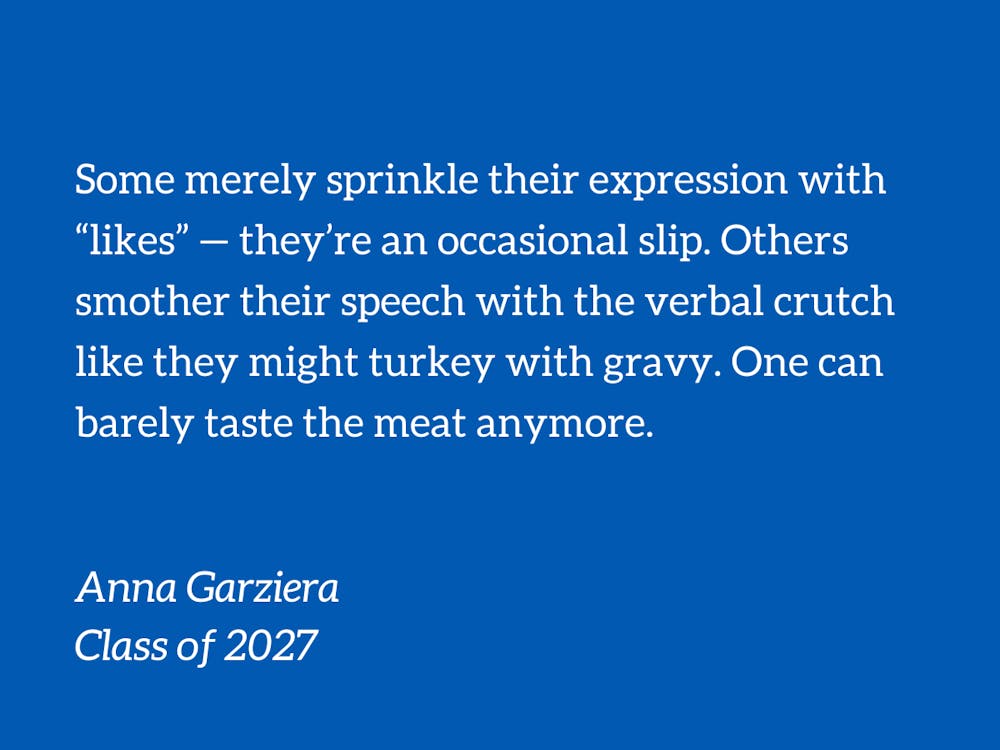Interview season is here: Graduating seniors are weighing jobs and post-grad options, juniors are contemplating internships and sophomores are considering enjoying one more summer at home. You might think whether you get the position depends on grades and extracurriculars.
But what if it depended on how many times you said the word "like"?
I read an opinion article last summer that stuck with me. In his WSJ article, Tevi Troy describes one of the standards against which he measures prospective hires: their scores on the like-o-meter.
On any given day, an outsider might think that Troy is conducting a normal interview. But he isn’t only listening for experience and ambition: "I then make a hash mark every time the applicant uses the word 'like.' Too many and I’m already thinking about the next candidate," he writes.
The first time I read his article, I thought his methods a little harsh. Certainly, there’s more to an employee than his eloquence during an interview. But my criticism stemmed from uneasiness: How many of my friends would pass his test? Would I pass myself?
Sadly, as confident as I am that the Duke student population would be otherwise qualified, I don’t think many of us would get a satisfactory score on Troy’s like-o-meter.
It’s easy to notice. Once we start counting the "likes" in each other’s speech, they’re hard to unhear. Some merely sprinkle their expression with "likes" — they’re an occasional slip. Others smother their speech with the verbal crutch like they might turkey with gravy. One can barely taste the meat anymore.
In fact, "like" is not the only filler that we overuse. "You know," "so," "well" and "very" fall under the same category of vocal disfluencies.
When used cautiously, these words can aid our speech: Without them, we’d sound robotic. But there’s a sweet spot we should try to land on. While drowning in fillers, we can’t expect to be articulate.
And it isn’t just our generation that has this problem. Some of our professors have caught the same bug.
It’s almost ironic. A professional relying on discourse markers to explain their subject is somewhat pitiful. Even at an elite university, we don’t expect lectures to feel like speeches. But we also shouldn’t have to put up with professors struggling to communicate in class. Really, it’s worse than them wearing jeans.
Within the student population, I’ve noticed that we don’t only use fillers to supplement our lacking vocabulary. We also chronically steal phrases from each other’s mouths. It’s expected that such slang defines each generation. But we must not overdo it. When we only express ourselves through colloquialisms, we shrink our unique lexicon.
I’m not the first to point out our shameless overuse of filler words — but not a lot of people are talking about it. Duke wants every class, starting with the Class of 2028, to be "climate fluent." How about we start with just becoming fluent?
Some might argue that we should have bigger priorities. After all, there’d be no point in speaking fluently if we had no knowledge base. We’d have nothing to talk about.
But we must ask ourselves this: Is getting the point across the only thing that matters? No. We should value elegance, efficiency and accuracy. We should want to convey each idea better and with fewer words.
In fact, getting your point across is impossible if you don't have the word-stock. An argument is not convincing if it takes you ten minutes and your whole body, overwhelmed by gesticulation, to express yourself.
What led to this deficiency? Society has seen several worrying trends in the past few decades. We read less, text more and don’t engage in debate and public speaking as much as we used to.
But as opposed to other modern obstacles, the fall of fluency is something we can fix directly.
If we want to speak more fluently, we only need to grow our vocabulary, brush up on our grammar and practice speaking in front of a crowd. We could try reciting famed speeches in front of the mirror and feel what it’s like to speak fluently. We could try to replicate President Kennedy’s tone in our everyday interactions. And the great thing with speech is that it’s fleeting. We can make mistakes.
It doesn’t even have to be a hard commitment. For instance, we could start by tracking whenever we find it hard to explain something during a class discussion and later read up on the subject to reinforce our understanding. Next class, we could raise our hand and try again.
Get The Chronicle straight to your inbox
Sign up for our weekly newsletter. Cancel at any time.
But if we want to continue to indulge in more slack forms of speech when the stakes are low, we need to at least be able to flip the switch and speak fluently to our prospective employers — just in case their mental like-o-meters are running in the background.
Anna Garziera is a Trinity sophomore. Her pieces typically run on alternate Tuesdays

